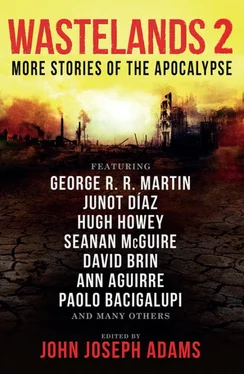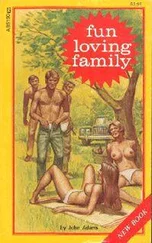A wash of brilliance exploded up out of the highway, the slant of the sunlight reflecting up from thousands of sloped windshields, and suddenly the road below them was a sparkling, blinding sheen of narrow white light, hemmed in by the trees on either side. A brilliant path laid suddenly down on the surface of the world, plunging southward into the heart of the far horizon.
Margaret caught her breath, and whispered: “Where are we?”
“We’re in California,” said Jimmy.
Her hand found his, grasped it tightly. Her breathing eased, and her tensed, knotted body began to relax.
“Oh, Nabil,” she said at last. “It’s beautiful.”
“Of course it is,” said Jimmy.
They sat watching until the sun dropped below the trees, and when Margaret closed her eyes Jimmy tucked the blanket about her shoulders and kissed her gently on her forehead. “Goodbye, Margaret,” he said.
* * *
They buried her the next day, in the graveyard copse, beside the drawing of her husband. Jimmy said a few words when they were done, and then, after a moment’s silence, they crossed the highway and settled into their lawn chairs.
“I’m thinking tomorrow we should go into town and pick up some Cheerios,” said Jimmy. “Cheerios don’t go bad, ever. You can’t kill Cheerios. They’re the cockroach of breakfast cereals.”
“I’m leaving tomorrow,” said Patrick.
Jimmy looked over. “Really? Where are you going?”
“Down to Florida. I’ve got family down there.” He shrugged. “I’m immune to this fucking thing, and I’m not the only one with my genes.”
Jimmy nodded. “It would be nice if you stayed, though.”
“You should come with me, man. There’s nothing here for you.”
“There’s my café. And there was Margaret, and there was you.”
“That’s over now.”
“ That is, sure.”
They lapsed into silence, and watched the birds wheel and dance over the dead rows of cars.
* * *
The next day, Jimmy found a big hiker’s backpack and stuffed it with donuts and beef jerky and a two-liter Coke bottle filled with fresh creek water. “Be careful,” he said, handing the pack over. “Stay near the highway. Sleep inside cars at night. Wild things are starting to come out, now that we’re gone.”
Patrick nodded. “Thanks.”
“Come back and visit if you can. We’re always open.”
Patrick grinned. “It’s been a pleasure, Jimmy,” he said. They shook hands and he turned away, moving down the shoulder, southward.
Jimmy watched him disappear into the early morning haze, then went back into the café and tidied up a bit. He took Margaret’s sheets off the cot and burned them in a little pyre. He rubbed the window clean, swept the floor, polished the table. Then went outside and settled into his lawn chair, and waited.
* * *
Four days later, a stuttering, puttering sound came down off the highway. He jumped to his feet and ran up, peering north. A scooter was winding its way through the cars, dragging a small makeshift wagon behind it. An Indian woman sat hunched over the handlebars, navigating carefully. The man in the seat behind her lolled against her back. His skin was pocked and white, his eyes vermillion.
They were very close before the woman saw him. She started and braked hard, and the sharp squeal of her tires pierced the morning’s stillness like a needle. A small boy with tousled hair and large round eyes popped his head up from the wagon, and said: “Are we there yet, Mommy?”
The woman clambered carefully out of her seat, then turned to catch the man behind her, who was listing hard to the side. Jimmy rushed over and took his other arm, and together they eased him onto the street.
“Thank you,” said the woman, warily. The boy clambered out of his wagon and hid behind her, peeking shyly up past her skirts.
The sky was a soft shade of blue, the sunlight bright and crisp. A breeze blew through the cars, carrying with it the stench of decay, the bouquet of morning. Jimmy smiled. “Welcome to Jimmy’s Roadside Café,” he said. “I’m Jimmy.”
THE ELEPHANTS OF POZNAN
ORSON SCOTT CARD
In the heart of old Poznan, the capital of Great Poland since ancient times, there is a public square called Rynek Glowny. The houses around it aren’t as lovely as those of Krakow, but they have been charmingly painted and there is a faded graciousness that wins the heart. The plaza came through World War II more or less intact, but the Communist government apparently could not bear the thought of so much wasted space. What use did it have? Public squares were for public demonstrations, and once the Communists had seized control on behalf of the people, public demonstrations would never be needed again. So out in the middle of the square they built a squat, ugly building in a brutally modern style. It sucked the life out of the place. You had to stand with your back to it in order to truly enjoy the square.
But we’d all seen the ugly building for so many years that we hardly noticed it anymore, except to apologize to visitors, ruefully remember the bad old days of Communism, and appreciate the irony that the occupants of such a tasteless building should include a restaurant, a bookshop, and an art gallery. And when the plague came and the city was so cruelly and suddenly emptied, those of us who could not let go of Poznan, who could not bear to eke out the last of our lives in the countryside, drifted to the old heart of the city and took up residence in the houses surrounding the square. As time passed, even the ugly building became part of the beauty of the place, for it had been part of the old crowded city now lost forever. Just as the toilets with little altars for the perusal of one’s excrement reminded us of the many decades of German overlordship, so this building was also a part of our past, and now, by its sheer persistence among us, a part of ourselves. If we could venerate the bones and other bodily parts of dead saints, couldn’t we also find holiness of a kind even in this vile thing? It was a relic of a time when we thought we were suffering, but to which we now would gladly return, just to hear schoolchildren again in the streets, just to see the flower shop once more selling the bright excesses of overcopious nature, spots of vivid color to show us that Poland was not, by nature, grey.
Into this square came the elephants, a group of males, making their way in what seemed a relentless silence, except that a trembling of the windows told us that they were speaking to each other in infrasound, low notes that the human ear could not hear, but the human hand could feel on glass. Of course we had all seen elephants for years on our forays out into the gardens of suburban Poznan—clans of females and their children following a matriarch, gangs of mature males hanging out to kill time until one of them went into musth and set off in search of the nearest estrous female. We speculated at first about where they came from, whether their forebears had escaped from a zoo or a circus during the plague. But soon we realized that their numbers were far too great to be accounted for that way. Too many different clans had been seen. On Radio Day we learned, from those few stations that still bothered, that the elephants had come down the Nile, swum the Suez, swarmed through Palestine and Syria and Armenia, crossed the Caucasus, and now fed in the lush wheat pastures of Ukraine, bathed in the streams of Belarus, and stood trumpeting on the shores of Estonia and Pomerania, calling out to some god of the sea, demanding passage to lands as yet unpossessed by the great stumpy feet, the probing noses, the piercing ivory, and the deep thrumming music of the new rulers of the world.
Читать дальше












